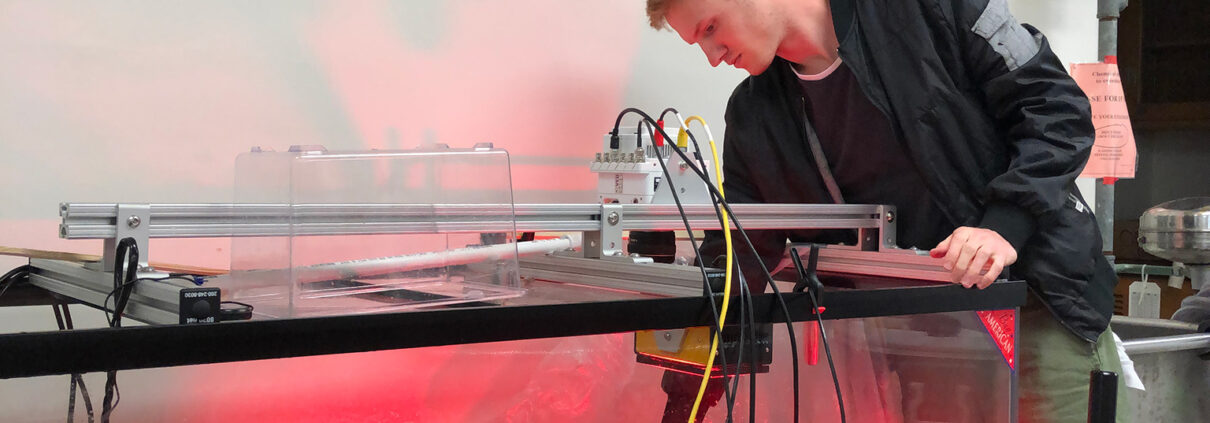I grew up along the northern Gulf Coast, so the ocean has kind of always been in my life – especially once I got to The University of Tampa and started studying marine science. It really wasn’t until the last year of my Master’s degree at CSU Long Beach that I began considering a career outside of academia. I was originally planning to get my Master’s and then pursue a PhD to continue studying the biomechanics of feeding and locomotion in fishes. It was then a fast pivot out of academia and into the field of science-policy through the California Sea Grant State Fellowship. I realized that I wanted experience outside of an academic setting to inform my career journey; personally, the standard academic trajectory didn’t leave me a huge amount of room for variability or creativity in using some of the interpersonal skills I had picked up during my research. Science-policy relies heavily on these skills in various settings, and it seemed like an interesting tangent to pursue – and I’m very glad I did.
A series spotlighting OST's position at an evolving science-policy interface
By Emma Stone
May 19, 2022Tell us about your journey to a career at the nexus of ocean & coastal science and policy - what was an unexpected turn or moment?
Would you call that decision one of the more formative moments in your career? How does it impact your current work?
The California Sea Grant fellowship isn’t the only one, but it’s definitely the easiest to describe. It might be more true to say the Master’s program, though – the interpersonal, communication, and project management skills I learned there continue to be one of the most beneficial parts of that degree for my career. For example, if my research partners weren’t always on the same page, understanding how to balance those perspectives and expertises was invaluable. Those skills gave me the confidence to make the leap from academia into science-policy, especially since I jumped into the deep end with a fellowship at OST. That skillset was exactly what I needed, and what I’ve found most directly transferable regardless of setting. Setting a common goal and keeping participants aligned in a conversation is effectively the same, whether it’s scientists or staffers.
How does that come up in OST's position as a boundary organization? Do you find it to be an intrinsic challenge or more rewarding?
There was definitely a learning curve in determining exactly what that boundary was, and where OST sits in that nexus. But taking those skills and learning to apply them has been both challenging and rewarding – it allows for a great amount of creativity and strategy in the engagement of all our partners and participants, whether they’re stakeholders, scientists, or policymakers. There’s also the aspect of “how do we make our work far-reaching, forward-thinking, and adaptable for everyone involved?” That’s always a challenge, and one that I enjoy.
The reward comes from seeing things through the whole process and filling this unique niche in the science-policy ecosystem. We sit between sometimes disparate audiences and perspectives – someone described OST to me as a group of “expert generalists”, which I love. But more than anything, it’s giving some of our partners (especially academics) an opportunity to be engaged in policy, both formally and effectively – a lot of them are very excited to do so, and it’s amazing to see.
From that, it sounds like the Legislative Science Service would be your prime example of OST's vision and mission?
I think so. Fundamentally, the Legislative Science Services program is about extending the same services to the legislature that have already been established with partners in the executive branch. I was fortunate to join the program as it was being established and launched, so I got to support the first year’s implementation during my fellowship. It put my interpersonal and management skills to the forefront and drove home how transferable they are. I’ve been working on engaging various legislative offices and their staffers and helping plan formal delivery of science to the legislature. Beyond our “Ask an Expert” briefing series, we have been determining the best methods for follow-through and communication for staffers based on what the legislature actually wants. Their primary concerns are almost always finding solutions to issues facing their constituents or local districts, and considering this in the context of the environment and natural resources is an important balance when communicating science. So how those topics are broached and presented is a challenge in and of itself, but a necessary learning experience for working in science-policy.




